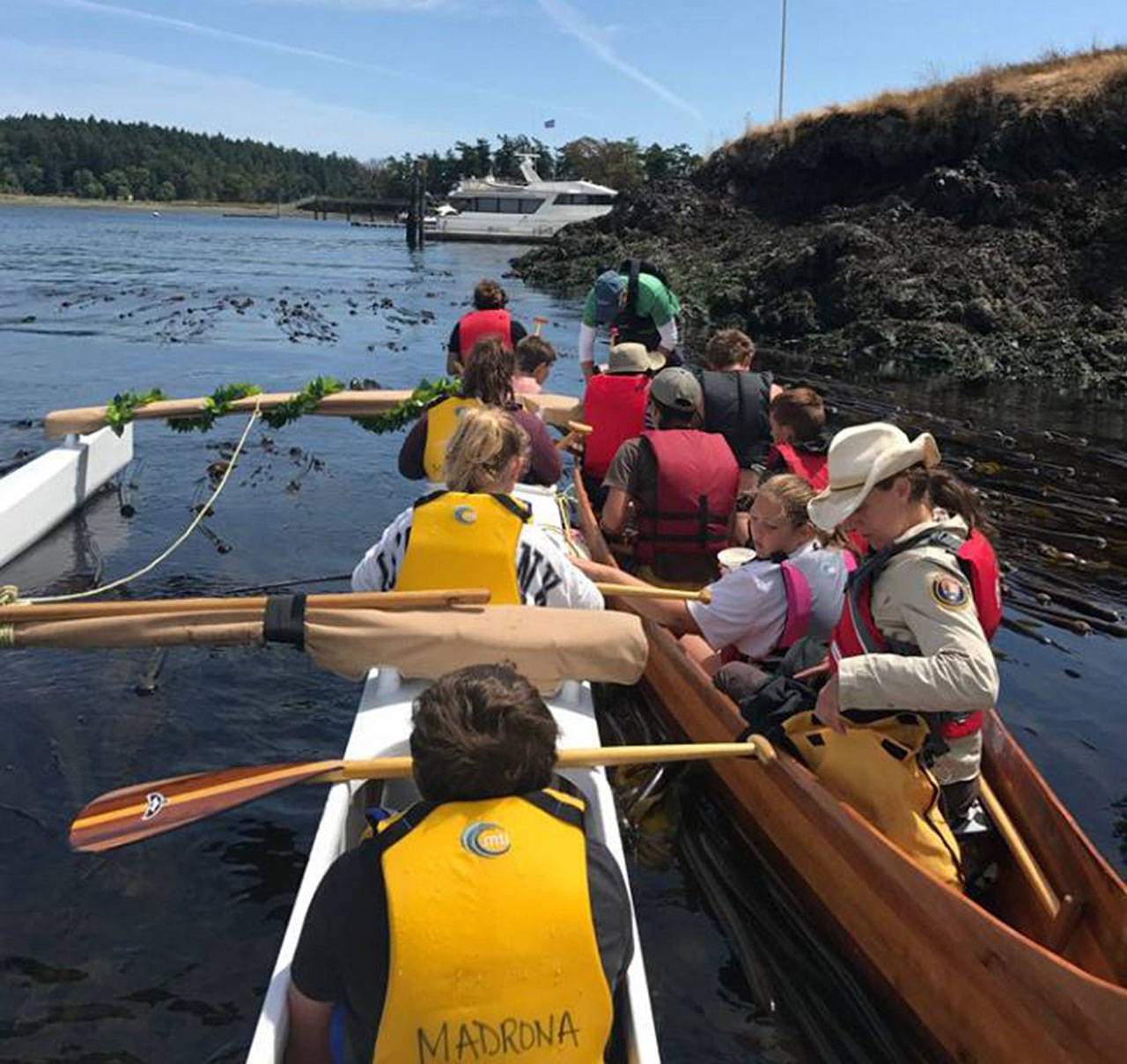To Matt Wickey, a crucial element was missing from the San Juans when he moved to Friday Harbor from Hawaii in 2016.
“When I first came here, I was … struck by a beautiful island; cultural, natural resources; lots of tribes, but no canoe culture present,” he said. “That really kind of stirred something up in me. I was like, ‘How can this be? How is this forgotten?’”
With his years of canoeing in Hawaii, as well as his connection to a Coast Salish master carver, Wickey is looking to resurrect a San Juan Island canoe culture that has been lost over time.
Wickey hopes to unveil the project’s “first big showcase” at the San Juan Island Yacht Club’s Opening Day Boat Parade at 2:15 p.m., Sunday, May 6. Two Coast Salish-style canoes are scheduled to be paddled by about 10 adults and youth.
“The presence of these Lummi-inspired traveling canoes in our Opening Day Boat Parade both reminds us of our Native American heritage in the islands and of the role human-powered craft can play in appreciating our island home,” said Chris Reed, fleet captain of the San Juan Island Yacht Club.
Wickey’s mission to resurrect local canoe culture began in 2016 when he formed the Kaigani Canoe Voyaging Society, a nonprofit dedicated to teaching youth, as well as adults, how to operate a Hawaiian canoe and the culture behind it. The nonprofit uses a roughly 6-year-old, 46-foot-long canoe, called Kaigani, which will eventually be rigged with sails for traditional Polynesian outrigger paddling.
Soon, he teamed up with Dean Washington, a Lummi Nation master canoe carver, through a mutual friend in Hawaii. In 2016, Washington mentored Wickey and other locals on how to build canoes reminiscent of those used by Coast Salish Tribes, who are native to the San Juans.
They also created forms for the 25-foot vessels to allow community members to replicate designs, which are now housed in the Friday Harbor High School STEM building.
“What that means for the community is shared canoes to be used to teach kids canoeing, ocean safety, [and] just getting on the water and connecting to the water, connecting to their home,” said Wickey.
The following year, Washington led the construction of two more Coast Salish canoes that were built in conjunction with local students and adults through Wickey’s nonprofit, the Friday Harbor High School STEM program, Spring Street International School, Island Rec, Orcas and Lopez students, and Friends of the San Juans.
Friends of the San Juans Executive Director Stephanie Buffum said the organization secured funding for the construction of those canoes.
“This is been part of our honoring of maritime history in the San Juan Islands starting with the construction of Coast Salish, cedar-strip-style canoes,” she said.
Wickey noted San Juans’ connection to Hawaii as well, including how the Town of Friday Harbor was named after a Hawaiian native, with the last name of Friday.
“There’s a really rich history between Hawaii and the San Juan Islands,” he said.
Wickey has been involved with competitive outrigger canoe racing, as well as coaching youth, since 1997. He was mentored in what he calls the “cultural protocols of Hawaiian canoes” from many Hawaiian elders.
In Hawaii, said Wickey, there’s a popular saying: “The canoe is in our island, the island is in our canoe.”
Wickey aims to teach that connectivity to islanders through the canoe Kaigani, passing down traditional Hawaiian canoe language and chants, as well as general maritime safety rules.
“We will honor Hawaiian canoe culture, the spirit of voyaging canoes and the shared waterways with Coast Salish first peoples of the San Juan Archipelago,” he said.
There have already been local programs centered around Kaigani and two of the Coast Salish canoes, such as a survival program through Island Rec last summer. This May, Wickey plans to run a three-week canoe program through Spring Street International School, where sixth graders will canoe in local bays, and possibly to Henry Island.
He hopes to create other programs too, for middle school and high school students, as well as adults, possibly taking extended, ocean voyages to Canada in Kaigani.
Wickey’s nonprofit is already collaborating with a joint program through Stanford University and the Polynesian Voyaging Society. He also plans to enter Kaigani in the human-powered competition, Race to Alaska, next year.
The work today, said Wickey, is a way to unearth the history of the past.
“There is a huge untold story [and] recognition of many peoples here on the islands we call home,” he said, “Hawaiian oral history included.”




